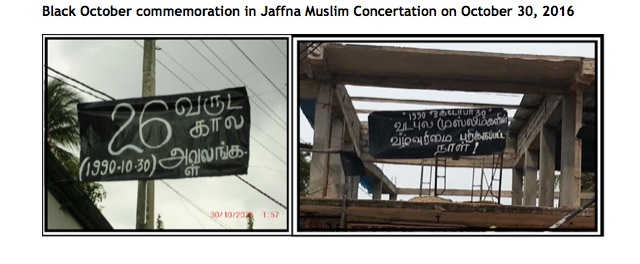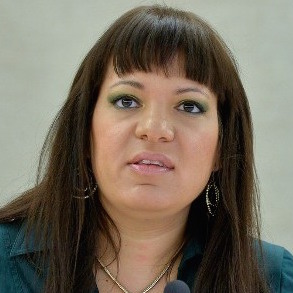An event on October 30, 2016
Last Sunday, October 30, 2016, a commemoration event was organised in
Colombo by the newly formed group “North Muslim Civil Society” on the
theme of “A necessary Solution for Northern Muslims”. I was struck by
the fact that the chief guest and guest of honor were the prominent
political leaders of the Sri Lankan Tamil community, and leaders of the
opposition. These leaders are spokespersons of the rights of Tamils of
Sri Lanka. I decided to travel to Colombo from Kandy, to participate in
the event even though I had not received a formal invitation.
A Similar event held in the City of Jaffna
On the same date, at the same time, Muslims of Jaffna, Moor Street
organized an event in Jaffna City, the heartland of Tamil nationalism,
hoisting black flags. A number of similar events were held during the
third week of October in different concentrations of the displaced of
the north Muslims.
Expulsion of north Muslims in October 1990
The third week of October has become a symbolic time period for the
north Muslims as 26 years ago in 1990 Muslims who lived in more than 100
concentrations spread across the five districts of the Northern
Province were forcibly expelled wholesale neither by the war situation
that existed at that time nor by any sort of tension between expelled
(Muslims) and majority population (Tamils) but by the “ order from the
top” as said then by all armed cadres in all Muslims locations where
they successfully carried out the order. The sudden proclamation in
“Jaffna Moor Concentration” which consisted about 10 per cent of the
total population of the city was early morning October 30 and the order
was for them to leave in two hours, leaving behind every material thing
that belonged to the community or otherwise face the death; Muslims of
other districts and concentrations in the north were given a 48
hour-ultimatum.
“Muslim Displaced”
From the first of November 1990, the north became depleted of its
Muslim population. Since that time to the present, most of the expelled
Muslims have been living as “displaced” in the southern part of the
country under the patronage of the state with minimal welfare
assistance. In this quarter of a century, the expelled Muslims have
attempted to return home and have failed though some have managed to
return intermittently on their own in desperation indirectly benefiting
from no war and peace-talk situations.
“Ethnic cleansing”
Commemorating the event of expulsion has become a yearly ritual of
the north Muslims for 26 years and yet their cry for justice has rarely
been a concern for the custodians and guardians of law and justice. The
victims labelled the month of expulsion as “Black October” but this
label has never take root in media parlance or in political and human
rights discourses, nationally or internationally. However, last year to
the surprise of many, the visiting special representative of the US
Government, Ms. Samantha Powel declared the event of expulsion of North
Muslims as an act of “ethnic cleansing” at an occasion in the Moor
Concentration of Jaffna on November 22, 2015 and further said that north
Muslims “had experienced ethnic cleansing even before the term ‘ethnic
cleansing’ was coined”. She, in fact was referring to internationally
known and recognized ethnic cleansing events that happened in Bosnia in
the year 1993.
Mr. Sumanthiran
Mr. Sumanthiran was the first Tamil leader to pronounce the term
“ethnic cleansing” concerning the expulsion of north Muslims and
acknowledge the wrong done to them by the “Tamils”. He spoke of this on
two occasions in the month of October, 2015. He was conscious of what he
spoke on this subject and had the courage and conscience to speak
openly on this matter. He was firm in his commitment to justice and
called on the Tamils to acknowledge and accept the suffering of north
Muslim and their right to seek justice and redress of grievances.
Sadly, his outspoken remarks on this was neither acknowledged by the
Tamils in general nor welcomed by Muslim leadership. He was very heavy
criticised for his remarks within the Tamil nationalistic forces. At the
same time, no Muslim leadership openly appreciated what he said and in
reciprocation acknowledged the suffering and genuine aspirations of the
Tamils as regards the national question of Sri Lanka.
Expectations of the presence of two Tamil leaders in the October meeting
I went to Colombo to attend the October event with many expectations.
My expectation was that the two Tamil leaders would introduce or at
least discuss the need for a new programme for the re-establishment
Tamil-Muslim community and on the plight of north Muslims. In a brief
opportunity given to me by the organizers of the event I spelt out my
expectations and said that my expectation is that the two leaders will
spell out a new formula on rectifying the wrong done to the north
Muslims. I openly said that what we would like to hear from two leaders’
ideas arising from the foundation for reconciliation laid by Mr.
Sumathiran in his earlier remarks acknowledging the ethnic cleansing of
north Muslims.
A moment of Disappointment
On their turn, both “Tamil leaders” spoke at length but not on the
subject of the gathering. For the most part, Mr. Sumanthiran’s speech
was a response to a previous speaker in the same meeting who happened to
be a Muslim member of Northern Provincial Council closely associated
with a Muslim minister who heavy criticised Tamil leadership for being
discriminatory towards returnee Muslims. Mr. Sumathiran questioned the
sincerity of Vanni Muslim leaders in their resettlement activities in
the north. On his remark on ethnic cleansing that he did last year, he
said that he has been criticized by Tamils and he said that Tamils are
asking why Muslim leadership have failed to acknowledge the “massacre of
Tamils”. Mr. Sambanthan continued in the line of thinking initiated by
Mr. Sumathiran and indicated that the Muslim leadership had failed to
align with the Tamil leadership to protect north and east as a “Tamil
home land.” Neither spoke on the aspirations of the north Muslims and
the necessary role that the Tamil polity has to play in addressing them.
The issues of the “black” October
The core issue of Black October was lost in this political tug of
war. The organizers and participants became bogged down, in my view,
less important issues. Many do not realize that today the need of the
expelled north Muslims is not material benefits either in the places of
origin (Northern Province) or in the places of displacement (e.g.,
Puttalam). It is the North Muslims’ hopeful future, their identity,
recognizing them as victims of war and conflict; their dignity and
self-respect; the challenges of reconciliation and integration; their
political rights; the protecting their minority and cultural status.
Mr. Sumanthiran’s 2015 speech laid a foundation toward bringing about
a dialogue between the communities. Unfortunately, that opportunity is
lost. The Muslim polity, social movements and organizations have failed
to capitalize on his forthright statement for paving the way for a
constructive dialogue between the two communities. The Tamil polity and
movements have also failed equally to turn his remark into a golden
opportunity for rebuilding trust and mutual understanding between
Tamil-Muslim in the north and east and in the country. It is sad that
Mr. Sumanthiran himself will succumb to the tussles within the Tamil
polity and the vicissitudes of political mobilisations predicated on
majoritarianism. He could have stood high and adopted a principled
stance as was outlined last year. It is not too late, still. Likewise,
it is an opportunity for Mr. Sambanthan to be a statesman in addressing
the core issues of the day, looking beyond ethnic and regional
parochialism. The opposition leader has failed to deliver the
opportunity offered by Muslim civil society organization on October 30.
But still there is time and room for future action on this, I believe.
The hope
I hope my expectations are not in vain. A new momentum for
Tamil-Muslim reconciliation is very badly needed. On the issue of the
north Muslim, the Tamil polity and society have to make the first move
by recognizing the historical mistake done to this community and
expressing the willingness to rectify the injustice without delay. Tamil
society and its institutions (e.g., Northern Provincial Council) should
not wait any longer in initiating measures to remove the painful 26
year suffering of north Muslims. North Muslims are citizen of the
Northern Province. It is their right to be so though now they had to
live as displaced in Puttalam and other places in the south. It is the
right of their children and grand- children to feel that they too belong
to north. No one can deny this right and place conditions on it.
Whatever various politicians do, their omissions and commissions have
little to do with the recognition of the denial of justice to North
Muslims and the need to rectify it. North Muslims’ right to return is
not an issue for compromise. (Prof. S. Hasbullah)
Note: Author is a displaced Muslim of the Northern Province.
Home Sri Lanka Think Tank-UK (Main Link)






